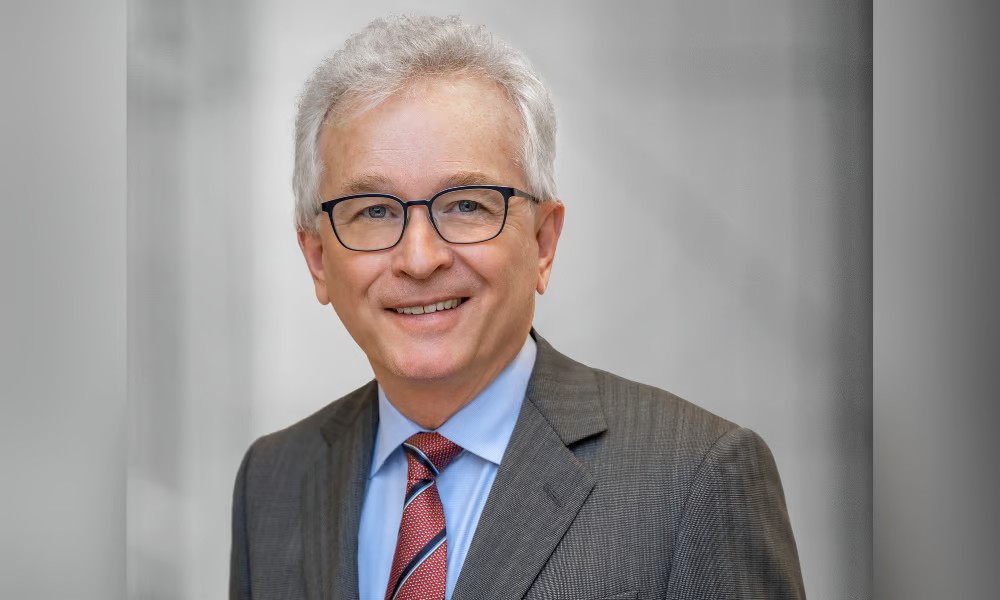
Benchers met to discuss updates on governance reforms and rules for paralegals and trust accounts

The Law Society of Ontario will prioritize restoring trust with its stakeholders, employees, and licensees, LSO Treasurer Peter Wardle said at a meeting of the regulator’s benchers on Wednesday – the first since Wardle was re-elected to his role amid criticisms of how he handled an executive pay controversy.
Wardle laid out a four-pronged plan for the task. This included executing the recommendations of a report that resulted from an investigation of the controversy, prepared by former associate chief justice of Ontario Dennis O'Connor; continuing to work on projects that serve the public interest, including ongoing governance reforms and an Indigenous cultural training course; appreciating the work of the LSO’s employees; and promoting respectful dialogue within the LSO.
“That’s partly my responsibility as the chair of this board, but it’s also your responsibility,” Wardle told benchers regarding the last point. “Yes, we have factions at Convocation, but that should not stop us from engaging in civil discourse.”
Referencing the controversy, which began to publicly unfold in February when news broke that former LSO chief executive officer Diana Miles had received a significant pay hike without Convocation’s knowledge or approval, Wardle said, “Out of every crisis comes opportunity.
“We have an opportunity to set a new tone, to explore new ideas, to move in new directions, to continue to make the law society the very best organization of its kind,” Wardle added. “That's what I’m prepared to dedicate the next 12 months of my time to. And I hope you are as well.”
Following Wardle’s remarks, benchers passed a motion approving amendments to the LSO’s bylaws to align with proposed changes to the Family Law Rules, the procedural rules for family law cases.
The changes, which were developed in collaboration with the Family Rules Committee, support an initiative to allow specially-trained paralegals to provide certain legal services in family law matters by laying out parameters for the initiative. These include outlining who can represent a party in family law proceedings and affirming that courts have the discretion to determine rights of appearance.
Bencher Michelle Lomazzo, who presented the motion, said the changes aim to “provide greater clarity around the permissible scope of activities” for these specially trained paralegals, who are known as family legal services providers.
Bencher Genevieve Painchaud then updated Convocation on behalf of the LSO’s governance review task force, whose mandate was amended in April to include advising the LSO on addressing the fallout of the Miles pay scandal.
Painchaud said the committee has been working with York University professor Richard Leblanc to implement the O’Connor report’s recommendations.
The committee has “proposed position descriptions for the treasurer, the CEO, and the corporate secretary, which are being reviewed by the task force to help ensure that authorities are clearly identified and to ensure accountability to Convocation,” Painchaud said. She added that “where there were gaps in law society processes and procedures, they have been identified and have either been addressed, or they will be addressed, as the work of the task force continues.”
The bencher noted that the task force was still working to fulfill its original mandate to develop proposed governance and electoral reforms at the LSO. Proposed changes unveiled last fall included slashing the proportion of elected lawyers in Convocation.
“Those proposed foundational changes were the subject of consultation in the winter, and we received significant feedback from licensees and stakeholders,” Painchaud said. “The task force has reviewed all that feedback and has heard the concerns about the proposals.
“We know we need to consider all we’ve heard in light of the O’Connor report and all that convocation has learned and experienced since the consultation was launched,” she added. “We have a working group dedicated to ensure we get back to this original purpose of the task force and adjust our approach to governance reform.”
On behalf of the professional regulation committee, Bencher Rebecca Durcan provided an update on a project to modernize the LSO’s rules governing licensees’ handling of client funds.
“As part of existing professional obligations, licensees are required to maintain account records and provide them to the Law Society upon request,” Durcan said. “Despite these obligations, some licensees refuse or fail to cooperate with the law society’s requests for records. This can cause significant delays in the audit or complaint process and the law society’s ability to take steps to protect client front funds held in trust.”
Durcan said the committee has approved a recommendation to explore a new requirement for licensees concerning trust accounts, which would involve “licensees providing an authorization and direction to the law society, allowing the law society to access account records directly from the respective financial institution in certain circumstances.”
She said the committee plans to return to Convocation in the fall with a detailed report of its findings.